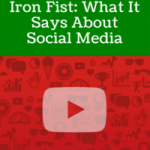Human nature is a very complicated thing and many times our emotions can rule our actions. I’m sure everyone, at one time or another, has had an awful day and snapped at someone at the office, on the phone or even over the dinner table.
Now, these instances happen in real time, where the interaction is not documented (unless there is a hidden camera at the water cooler). So if you make a mistake, you can apologize and smooth out the situation. Many times you can even improve on a poor first impression.
But when it comes to online interactions, it isn’t as simple. Your words last forever and can be seen by millions.
There have been many high profile stories in the news about everything from children finding out about their parents’ divorce by reading their mother’s Facebook profile (yes, real story) to job seekers losing their opportunity based on the negative things they “tweeted” about their interview on Twitter. So the first points to consider are to not only think before you write, but also make sure that what you are writing you don’t mind everyone seeing.
When choosing to interact with others online, you are in a way “going public” with your profile and building your (online) reputation. Yep, even if you are playing on Facebook your online footprint is being documented. That being said, when it comes to interacting and marketing online, your reputation is the most important thing in the world. And this reputation goes further than your profile page or online resume/CV. What your online reputation consists of is everything you write, every interaction, ever message you send, ever person you connect with. Your reputation will fuel what people say and think about you, with many of these opinions never being shared with you.
As your reputation is built around interaction, let’s talk about something to be weary of – negativity. Every person you interact with online is part of your virtual community. So whether they are directly connected with you or not, you share common contacts and associations (many of which can be unbeknownst to you). So it is important to be mindful of your words.
Let’s take LinkedIn for example. When you go into your favorite group, read through the latest discussions, you find one that peaks your interest. You click through, read the article and when you are halfway through discover that you completely disagree with the points being shared. They are totally wrong! Why? Because in your experience this is not true. Great! That’s what LinkedIn discussions are all about, sharing different points-of-view, insights and experiences. Who knows, your point could change the point-of-view of the person posting the discussion. Your information is pretty powerful.
But, how do you make your point? Remember, LinkedIn is a professional site. Do you insult the person? Speak in a condescending tone? Send them a private message telling them that they are silly and way off point?
If this sounds like you, please be careful with what you write (and this goes for all of the other social sites as well)!
When you want to share your point-0f-view, do it in a productive professional manner. Remembering that this is a public forum, watch your words. If you don’t agree, don’t just say that. Make a case, share your wisdom and experience. By engaging with others (especially if the person you are interacting with has a large following) you have a prime opportunity to grow your own online visibility. The point is that you want to build your reputation, not tarnish it.
Being consistently negative can result in word of your behavior spreading, people will discuss it, you may be ignored and more. The worst part? Many times you won’t even know it is happening until its too late.
If someone irritates you, ignore them or remove them as a connection. This constant refinement will also help you get the most out of your time online. Sending them a message telling them you don’t like them is not the answer. And guess what? Sometimes these “hate mails” get forwarded, shared and discussed. Again, this activity is something that you won’t know is occurring.
Now don’t get me wrong, I’m not saying you shouldn’t have your say. Opinions are crucial in the social media space. My point is to make your contributions online productive and aligned with your professional acumen. This will help you build a strong, credible profile and help your business grow. Being negative and antagonistic isn’t the answer.
With that said, many of the so-called social media rules are not new, groundbreaking or even shocking. They are based on the fundamentals of communication and interaction. So whether you are using the online media for personal or business reasons, treat others as you would like to be treated.
So what do you think? Have you come up against this while online and how have you dealt with it?
Need Online Marketing Help?
Fill Out the Form Below and We Will Get Right Back to You!
[ninja_forms_display_form id=1]





